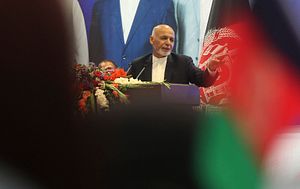Last week, it appeared that the United States and the Taliban were creeping tantalizingly close to a deal and Uzbekistan seemed well poised to play a critical part in a parallel peace endeavor.
But on Saturday, the Afghan Foreign Ministry issued a statement criticizing the Uzbek government’s formal reception of Taliban representatives and on Monday the eighth round of talks between the U.S. and the Taliban ended without the rumored done deal.
As the peace process moves forward, the weight of expectation and worries about the future cloud the road ahead.
The deal that U.S. peace envoy Zalmay Khalilzad is hammering out with the Taliban’s political office in Qatar centers on the withdrawal of U.S. troops and a pledge from the Taliban to not provide safe haven to terrorist groups, to be followed by a ceasefire and intra-Afghan peace talks.
So far, the Taliban continue to refuse direct negotiations with the Afghan government, which the group has long called a “puppet.” In July, Qatar hosted the Intra-Afghan Conference for Peace (jointly sponsored with Germany), which brought together Taliban, Afghan government representatives, women, and civil society for talks. But participants attended in their personal capacity, rather than official, as ordinary Afghans “on equal footing.”
Khalilzad left Qatar on August 6, optimistic after three days of talks. The Taliban were even more so: A Taliban spokesman said that the eighth round of talks would end in a deal. Khalilzad has stated previously that he aims for a deal by September 1.
Khalilzad headed to India and top Taliban negotiator Mullah Abdul Ghani Baradar headed to Uzbekistan.
Technical teams continued the negotiations for six more days, but did not ultimately settle a deal. While a Taliban spokesman had said a deal would be signed after the Eid al-Adha holiday, on Monday the negotiations ended without an agreement. Both sides, the AP reports, will consult with their respective leaderships on next steps.
Ahead of scheduled talks with the Uzbek government, the Taliban backed Tashkent’s proposal to host the next round of intra-Afghan talks in Samarkand.
Baradar and his team were received in Tashkent by Foreign Minister Abdulaziz Kamilov. On Twitter, Uzbek Ambassador to the United States Javlon Vakhabov posted a picture of Kamilov embracing Baradar next to a picture of Kamilov in 1999, then also foreign minister, standing beside Mullah Muttawakil, foreign minister for the Taliban government in Afghanistan. Vakhabov remarked “Very symbolic!”
On August 10, the Afghan Foreign Ministry issued a statement that noted its welcome of international and regional cooperation on peace initiatives, but criticized Uzbekistan’s “formal” reception of the Taliban representatives. “However, the formal reception of the Taliban representatives and the dynamics of the talks, do not demonstrate as facilitating peace talks between the Government of the Islamic Republic of Afghanistan and Taliban representatives, by the Republic of Uzbekistan,” the statement said.
On August 11, during remarks to mark Eid al-Adha, Afghan President Ashraf Ghani defended Kabul’s centrality to establishing peace in Afghanistan. “Our future cannot be decided outside, whether in the capital cities of our friends, nemeses or neighbors. The fate of Afghanistan will be decided here in this homeland,” he said. “We don’t want anyone to intervene in our affairs.”
Afghanistan’s thrice delayed presidential election is set for September 28 — both Ghani and Chief Executive Abdullah Abdullah are running, alongside a wide field of other candidates. The Taliban, in turn, have urged Afghans to boycott the polls. Taliban attacks have continued largely unabated by the negotiation process. If a peace deal is struck soon, the next phase includes further intra-Afghan talks — which Uzbekistan has earnestly offered to host. But it’s unclear if the Taliban will ever speak to the Afghan government in its official capacity and that is what worries Kabul.

































